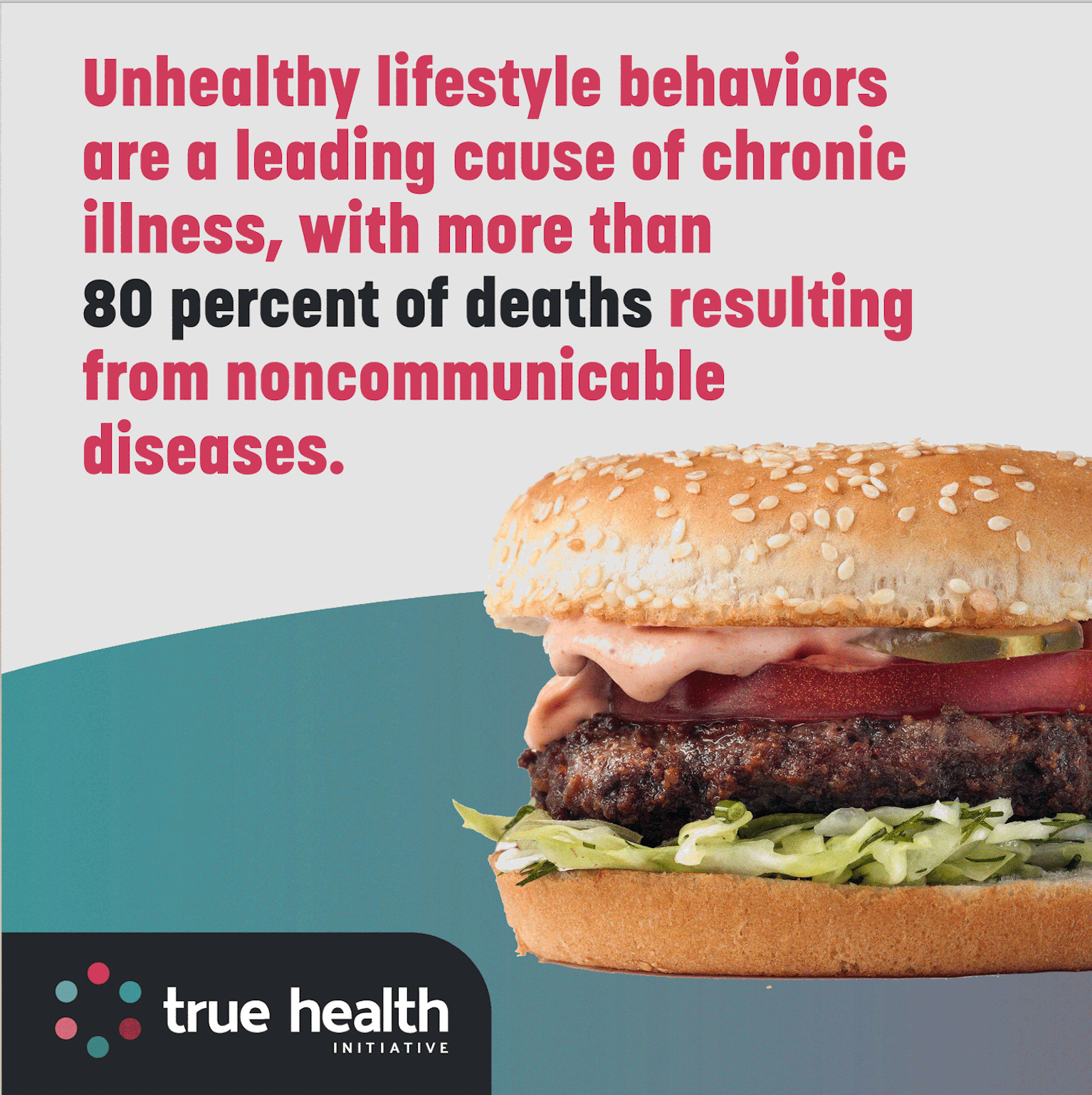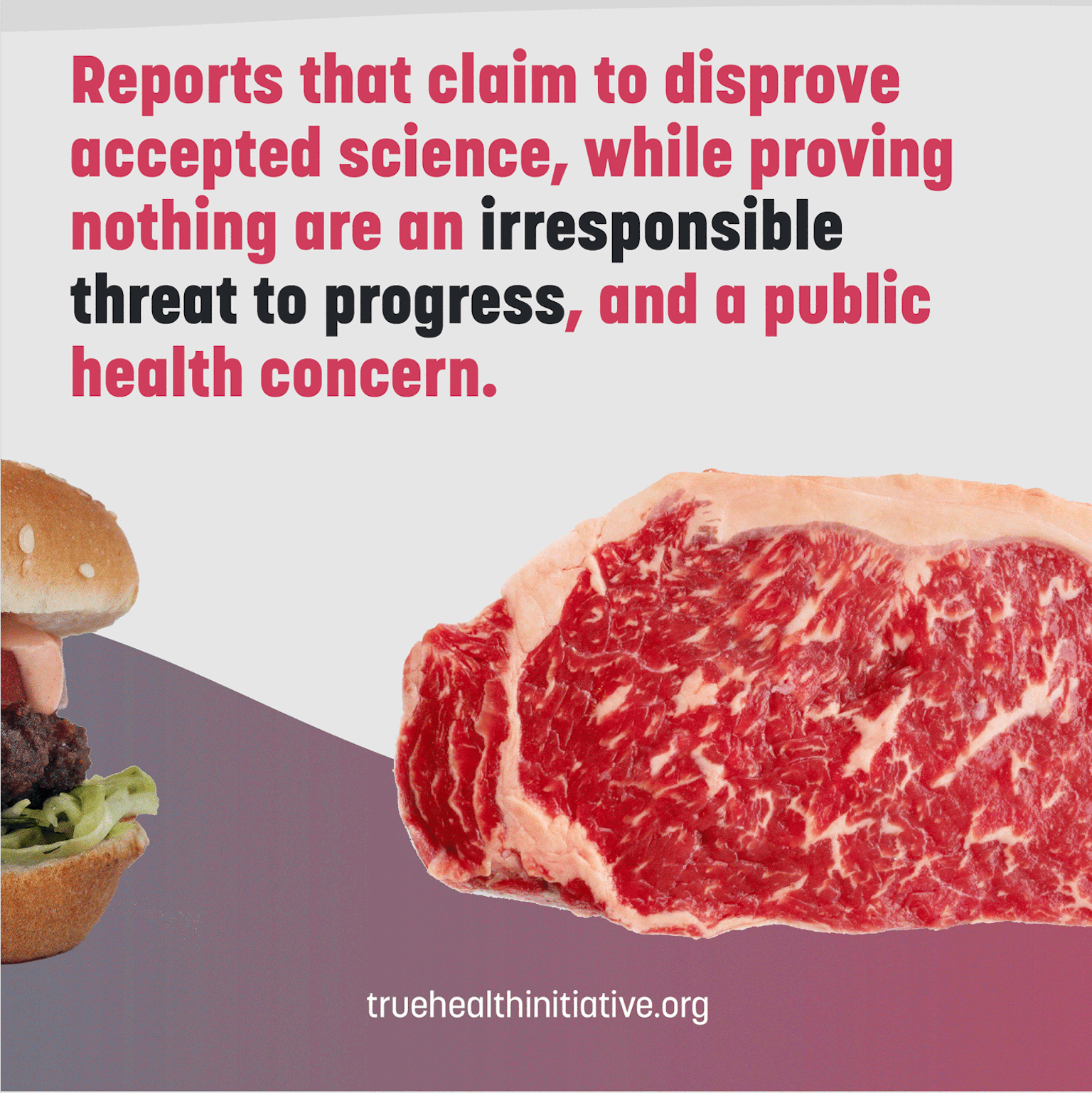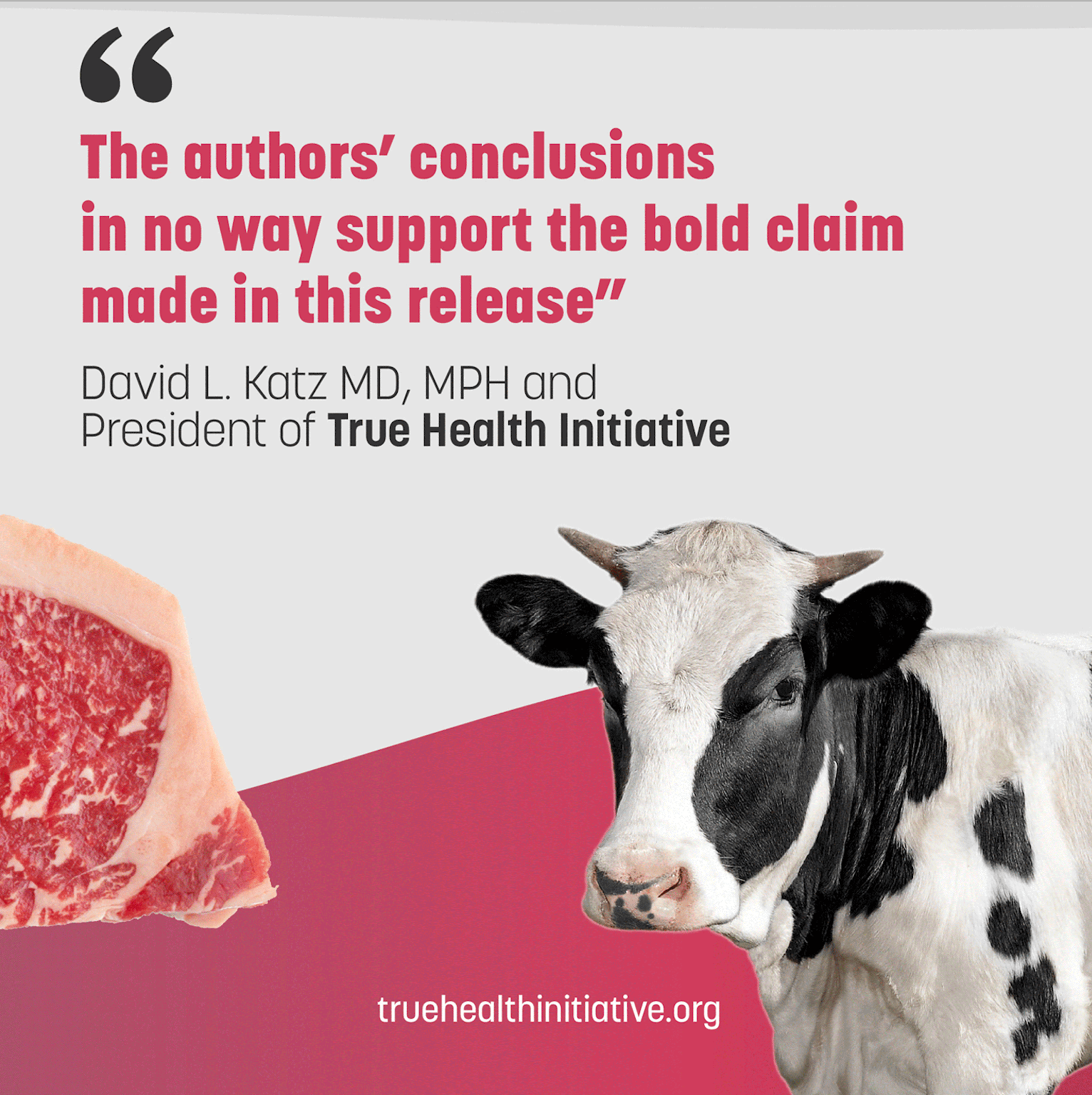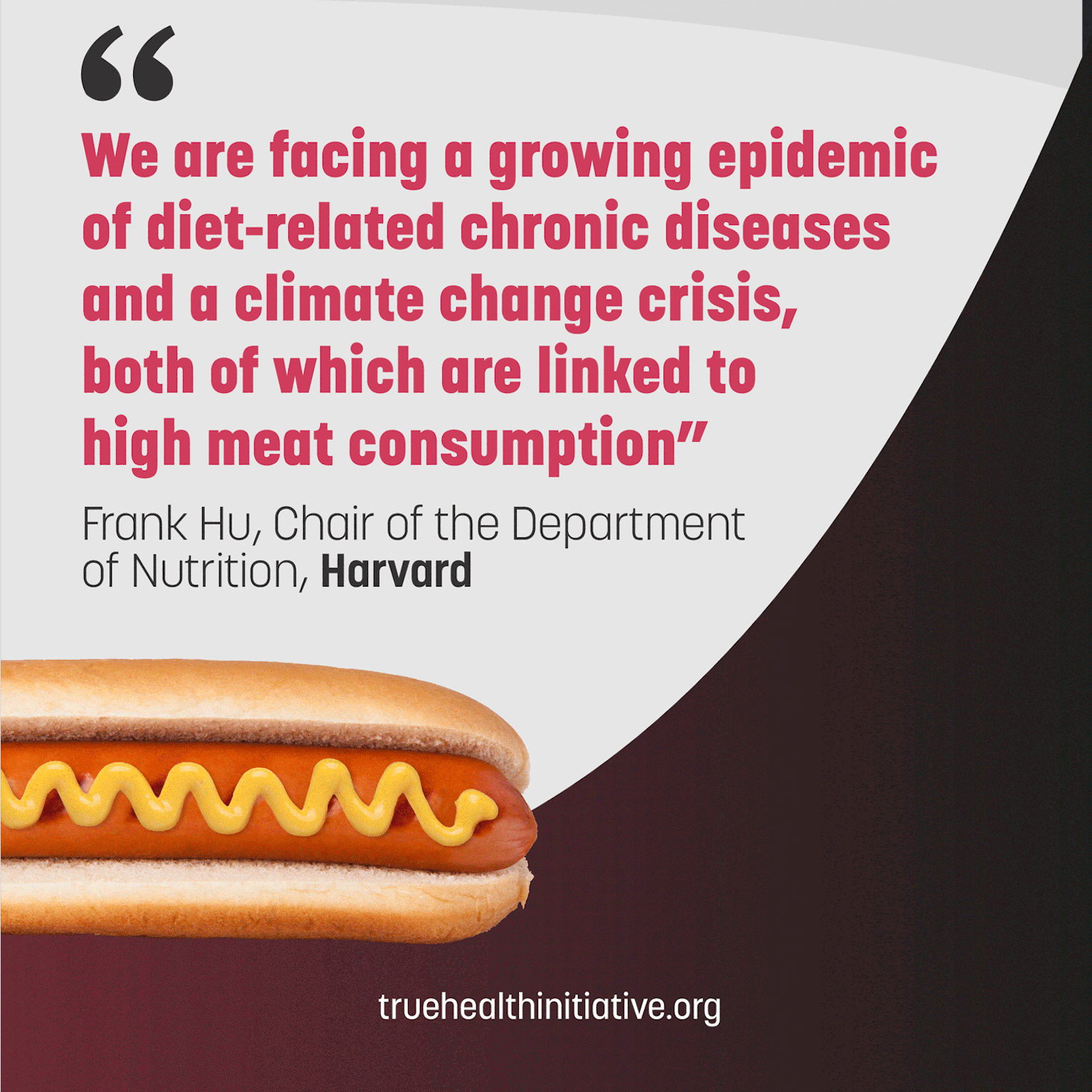On September 30, 2019, Annals Of Internal Medicine published a new set of dietary guidelines. The guidelines, based on a series of reviews, essentially advised adults to continue consuming red and processed meat at current levels.
This was trumpeted as a major news story, and media outlets worldwide were quick to pick up on it, reassuring legions of anxious consumers that they can scarf down their burgers and bacon without concern about negative consequences to their health. Headlines emerged such as: “Is Everything We Know About Meat Consumption Wrong? Stunning new recommendation says to keep eating it”, and “There’s no need to eat less red or processed meat.”
The only trouble is, this conclusion is utterly wrong, and threatens to add a mountain of confusion at the very time we face a public health crisis which demands that nutritional authorities provide clear and consistent guidance. In fact, much of the data upon which this analysis was based does show negative health effects from consuming red and processed meat – including increased all-cause mortality, cardiovascular disease, cancer, and diabetes.
The researchers put long-established and credible studies through a new measurement tool, known as GRADE, which was developed to evaluate pharmaceuticals. GRADE turns out to be a deeply flawed methodology for evaluating the impacts of lifestyle intervention.
Perhaps the person most responsible for the use of such a deeply inappropriate statistical methodology is Bradley C. Johnston. He co-authored the report, and says “there may not be any benefit at all” [from] “reducing your intake of red or processed meat.” Johnston previously authored a study, also published in the Annals of Internal Medicine, that challenged the quality of the evidence behind the recommendations to limit sugar. That paper, published online in 2016, was funded by the International Life Sciences Institute, a nonprofit group funded by large food and beverage companies that has come under intense scrutiny for its role in shaping food policy.
Created four decades ago by a top Coca-Cola executive, the International Life Sciences Institute has a harmless sounding name, but according to an in-depth report in the New York Times, “it is almost entirely funded by Goliaths of the agribusiness, food and pharmaceutical industries… and championed tobacco interests during the 1980s and 1990s in Europe and the United States.”
Food Revolution Summit speaker Marion Nestle is Paulette Goddard Professor of Nutrition, Food Studies, and Public Health at New York University. Referring to the Annals of Internal Medicine’s “red meat papers” she said: ”The papers come across to me as a concerted attack on dietary guidelines (national and international), on nutrition science in general, and on nutritional epidemiology in particular.”
Another Food Revolution Summit speaker, Neal Barnard MD, President of Physicians’ Committee for Responsible Medicine, called it “cancer-causing clickbait.”
Dr. Walter Willett, MD, P.H., is Professor of Epidemiology and Nutrition at Harvard T.H. Chan School of Public Health, and was the chair of the department of nutrition at Harvard Medical School from 1991 to 2017. He said: “This report has layers of flaws and is the most egregious abuse of evidence that I have ever seen.”
Despite the confusion created by all this, the facts are actually quite clear. We now have a great many studies, published in peer-reviewed medical journals, which have found compelling associations between red meat and early death. One of the largest, involving more than 500,000 people, was published in The British Medical Journal on May 9, 2017. In this enormous study, researchers found that consumption of red meat, both processed and unprocessed, was associated with increased risk of death from every one of the specific causes of death they looked at — including cancer, heart disease, stroke, and other cerebrovascular diseases, respiratory disease, diabetes, infections, kidney disease, and chronic liver disease.
We have an overwhelming body of science telling us that by eating less red meat, people will live longer and healthier lives. What we don’t need are sensationalized headlines that misrepresent the science, and direct people toward eating foods that will clog their arteries, lead to illness and early death, and also damage the health of the planet.
As a member, along with my son and colleague, Ocean Robbins, of True Health Initiative (THI), I’m seeking to correct the record on this dangerous development. THI is a global coalition of leading experts who range from paleo to vegan, seeking to fight fake facts and combat false doubts to create a culture free of preventable disease.
True Health Initiative issued a letter to Annals of Internal Medicine, recommending that they preemptively retract publication of these papers on the basis of grave concerns about the potential for damage to public understanding, and public health. This letter was signed by, among others, David L. Katz, MD, the Founding Director of Yale University Prevention Research Center; Richard Carmona, MD, MPH, FACS, the 17th Surgeon General of The United States; Christopher Gardner, PhD, of Stanford University Prevention Research Center; Frank Hu, MD, PhD, Chair of the Department of Nutrition for Harvard T.H. Chan School of Public Health; Dariush Mozaffarian, MD, Dean of Friedman School of Nutrition for Tufts University; and Kim A. Williams, MD, Chief of the Division of Cardiology for Rush Medical College and Past President of the American College of Cardiology.
In response to this request, Annals of Internal Medicine agreed to change, slightly, the headline of their lead press release. But they refused to retract or meaningfully modify their confusing and disturbing message.
So True Health Initiative issued a press release of its own, which is posted below. And under that, you’ll find statements from some notable THI members and colleagues on this topic.
The Center for Science in the Public Interest, the American Institute for Cancer Research, and the Harvard T.H. Chan School of Public Health have also issued responses.
Hopefully, this can help to clear up some of the confusion that may ensue from this deeply misguided report.
With a public health crisis that is growing deeper by the day, the world needs facts, not fiction, in order to guide public health policy. And the facts are in: If you value your health, and you want to minimize your risk of contracting heart disease, cancer, diabetes, dementia, or other chronic diseases, then eating less red and processed meat, or none at all, is very good advice indeed.
No amount of confusion stemming from this flawed interpretation of past studies can change this fundamental fact.
Press Release from True Health Initiative
True Health Initiative Respectfully Disagrees
A Response to the Annals Of Internal Medicine Reviews on Meat Guidelines
Derby, Connecticut September 30th, 2019:
The Annals of Internal Medicine has just published a series of systematic reviews and meta-analyses. Despite many of the reviews’ data showing negative health effects of consuming red and processed meat, such as increased all-cause mortality, cardiovascular disease, cancer and diabetes, the authors are calling for alternative ‘guidelines’ and advising people to continue consuming red and processed meat at current levels. True Health Initiative (THI) urges scientists, nutritionists, and consumers to look deeper.
The Annals‘ analyses are not a new development in science; they are simply using an ill-fitting measuring tool (GRADE), which is built to evaluate pharmaceuticals and not lifestyle intervention. This is why True Health Initiative, in conjunction with the American College of Lifestyle Medicine, proposed a metric specifically fitted to measure SOE related to lifestyle intervention, Hierarchies of Evidence Applied to Lifestyle Medicine (HEALM).
“The authors’ conclusions in no way support the bold claim made in this release,” David L. Katz MD, MPH, and President of True Health Initiative. Even using the ill-fitting GRADE measurements, the recommendations put forth by these reports is in direct contradiction to the data reported by the reports themselves. In one study where people simply limited meat, the researchers found a 10% reduction in cardiovascular mortality, a 6% reduction in stroke, and a 10% reduction in type 2 diabetes.
John Sievenpiper MD, PhD, who worked on one of the published systematic reviews and meta-analyses as a nutritional epidemiology and meta-analysis expert says, “Unfortunately, the leadership of the paper chose to play up the low certainty of evidence by GRADE, as opposed to the protective associations that directly support current recommendations to lower meat intake.”
“The recommendation that adults continue current red and processed meat consumption is based on a skewed reading and presentation of the scientific evidence… even with this skewed way of presenting the evidence, the reviews clearly indicate the benefits of reducing red and processed meat consumption,” Marco Springmann, Oxford Martin Programme on the Future of Food.
Unhealthy lifestyle behaviors are a leading cause of chronic illness, with more than 80% of deaths resulting from noncommunicable diseases. Reports that claim to disprove accepted science, while proving nothing are an irresponsible threat to progress and a public health concern.
“The panel’s blanket recommendation that adults should continue their red meat consumption habits is highly irresponsible. We are facing a growing epidemic of diet-related chronic diseases and a climate change crisis, both of which are linked to high meat consumption,” Frank Hu, Chair of the Department of Nutrition, Harvard.
“Sadly, the confluence of factors leading to today’s media frenzy directly contributes to the culture of nutrition confusion. It further erodes the public’s trust in science. And it’s bad for everyone and everything: our health, our environment, and our society.” P.K. Newby, author, Food and Nutrition: What Everyone Needs to Know.
In today’s society, a multitude of competing agendas and motivations obscure the fundamental and simple truths of healthy living. “Not all meat is created equal, but the science is clear that overconsumption of red meat and processed meat can be detrimental for both public health and the environment,” Danielle Nierenberg, Food Tank. If we don’t create enduring, sustainable change, we submit to a world where chronic disease and premature death, along with detrimental climate change, are the norm, not the exception. Richard Carmona, MD, MPH, FACS, The 17th Surgeon General of The United States says, “nutritional science is an essential part of public health which therefore requires national leadership to provide clear, concise and thoroughly scientifically vetted information to providers and the public in order to optimize food choices.”
Critiques From Prominent Authorities
The following is a compilation of quotes in response to the meat papers, published in the Annals of Internal Medicine on September 30th, 2019. These quotes come from leading professionals in the health community – most, but not all are members of True Health Initiative. This is meant to express the concern for public health that could result from the misinterpretation of these meat papers.
David L. Katz MD, MPH, President of True Health Initiative:
“The author conclusions in no way support the bold claim made in this release. The authors effectively say: ‘these papers show that when diet quality, dietary pattern, and what is replacing meat is systematically ignored because we don’t have those data – then very small variations in meat and processed meat intake (we mostly were unable to say which) are apparently associated with small differences in health outcomes – in the expected direction, but with extreme lack of certainty because of the data problems noted above. None of these papers report on ‘good health.’ They all compare rates of mortality, cardiometabolic disease, and cancer.’ ‘No Change’ in such outcomes does not mean good health; it means there’s more than one way to get the same, bad health.”
John Sievenpiper, MD, PhD
(co-author on one of the meta-analyses who strongly disagreed with the conclusions and recommendations from the panel):
“Unfortunately, the leadership of the paper chose to play up the low certainty of evidence by GRADE, as opposed to the protective associations that directly support current recommendations to lower meat intake. The signals would be even stronger if one considered substitution analyses with plant protein sources or investigated dose-response gradients which are used to upgrade data by GRADE, both of which I had requested. Unfortunately, I never saw the galley proofs to ensure that these changes had been made.”
Robert McLean, MD, FACP, President, American College of Physicians:
“It should be clear that the articles you reference are not recommendations developed by the American College of Physicians. Annals of Internal Medicine is an editorially independent, peer-reviewed medical journal with its own publishing protocols. ACP leadership does not give direction to the editors of Annals of Internal Medicine on what they should or should not publish.”
Marion Nestle, PhD, MPH:
Paulette Goddard Professor of Nutrition, Food Studies, and Public Health at New York University; visiting professor of Nutritional Sciences at Cornell University via www.foodpolitics.com says, “The papers come across to me as a concerted attack on dietary guidelines (national and international), on nutrition science in general, and on nutritional epidemiology in particular. The meat industry and its supporters will love them. Attacks on the quality of nutrition research have been coming from many sources lately: the food industry, of course, but also statisticians (John Ioannidis at Stanford is making a career of this), and some scientists (usually with ties to food companies). The criticisms themselves are not new. What is new is the vehemence and level of effort to discredit observational studies, particularly those based on self-reports of dietary intake. Yes, nutritional epidemiology has flaws, but the methods have been useful in many instances, as argued convincingly by two of its leading practitioners. The way I look at nutrition research is that it is essential to evaluate the totality of information available: laboratory, animal, human epidemiology, and clinical studies – to do this in the context of what people actually eat and the number of calories they consume, and to add in a hefty dose of common sense. Common sense is what’s missing in these studies.”
John Robbins, 2-million copy bestselling author, and co-founder of Food Revolution Network:
“We have a great many studies, published in peer-reviewed medical journals, that have found clear and compelling associations between red meat and early death. One of the largest, involving more than 500,000 people, was published in The British Medical Journal on May 9, 2017. In this enormous study, researchers found that consumption of red meat, both processed and unprocessed, was associated with increased risk of death from every one of the specific causes of death they looked at — including cancer, heart disease, stroke and other cerebrovascular diseases, respiratory disease, diabetes, infections, kidney disease, and chronic liver disease. We have an overwhelming body of science telling us that by eating less red meat, people will live longer and healthier lives. What we don’t need are sensationalized headlines that misrepresent the science, and direct people toward eating foods that will clog their arteries, lead to illness and early death, and also damage the health of the planet.”
Danielle Nierenberg, Food Tank:
“Not all meat is created equal, but the science is clear that overconsumption of red meat and processed meat can be detrimental for both public health and the environment.”
Marco Springmann, Oxford Martin Programme on the Future of Food:
“The recommendation that adults continue current red and processed meat consumption is based on a skewed reading and presentation of the scientific evidence… even with this skewed way of presenting the evidence, the reviews clearly indicate the benefits of reducing red and processed meat consumption.”
P.K. Newby, ScD, MPH, Author of Food and Nutrition: What Everyone Needs to Know:
“The vast majority of headlines flitting through newsfeeds do not reflect key study details: most showed a small and significant effect of red and processed meat on various health outcomes, for example. They also lack context: a number of results are consistent with the larger body of evidence showing increased risks of various diseases among those consuming a diet with higher meat intakes.”
Helen Harwatt, PhD, Animal Law & Policy Program, Harvard Law School:
“In addition to considering the non-communicable disease impacts of red and processed meats, it is worth noting that the WHO recognizes climate change as the greatest threat to human health – and red meat is a particularly significant contributor to global greenhouse gas emissions and rising temperatures. The authors recommendations are therefore irresponsible for public health in a number of high impact ways.”
“Red meat is a particularly significant contributor to global greenhouse gas emissions and rising temperatures. The author’s recommendations are, therefore, irresponsible for public health in a number of high impact, detrimental ways.”
Dean Ornish, MD, Clinical Professor of Medicine, UCSF and author of Undo It:
“Having seen what a powerful difference a whole foods plant-based diet low in fat and refined carbohydrates can make in people’s lives, these articles deeply sadden me because they will discourage many people from making changes that can transform their lives for the better.”
“While modest reductions in beef may not have had hugely beneficial health effects, eliminating beef and most other animal products can reverse the progression of many chronic diseases. These include even severe coronary heart disease, type 2 diabetes, high blood pressure, elevated cholesterol levels, and early-stage prostate cancer—as well as reversing cellular aging by lengthening telomeres and turning on hundreds of genes that keep us healthy and turning off hundreds more that cause illness within just three months. Many patients improved so much in only 9 weeks that they no longer needed a heart transplant. Most have been able to reduce or discontinue medications under their doctor’s supervision that they would have taken the rest of their lives. Medicare is covering this plant-based program for reversing heart disease nationwide.”
“These Annals reports will confuse millions of people into believing that ‘these damn doctors can’t make up their minds,’ countering decades of consistent research showing that a meat-based diet is unhealthful and undermining the public’s confidence in scientific research.”
Frank Hu, MD, PhD, Chair of the Department of Nutrition, Harvard T.H. School of Public Health:
“The panel’s blanket recommendation that adults should continue their red meat consumption habits is highly irresponsible. We are facing a growing epidemic of diet-related chronic diseases and a climate change crisis, both of which are linked to high meat consumption. Red meat consumption remains high in economically developed countries and is markedly increasing worldwide. In this context, it is unprecedented and unconscionable for a self-appointed panel to issue dietary guidelines that are tantamount to promoting meat consumption, despite their own findings that high consumption is harmful to health.”
Neal D Barnard, MD, FACC, President Physicians Committee for Responsible Medicine:
“The fact that the World Health Organization has found convincing evidence that processed meat causes cancer in humans, and that red meat is a probable human carcinogen, was not disputed in these new “guidelines” rather, the “guidelines” encourage people to continue their exposure to these dangerous products simply because their technically weak meta-analysis methodology was unable to detect sufficient evidence of benefit of avoiding these products that outweighed the study authors’ estimation of how much people like continuing to eat bacon, hotdogs, sausage, and burgers.
Randomized clinical trials by our team and others have clearly shown that over the short and long term, reduction or elimination of red and processed meat and replacement with healthier foods lead to significant weight loss, improvements in cholesterol and blood pressure, and substantial benefit for diabetes management.”
Christopher Gardner, PhD, Stanford University Prevention Research Center:
“The authors themselves note that their recommendations for people to continue eating unprocessed and processed red meats at current rates are ‘weak recommendations, with low-certainty evidence’. Beyond weak, I believe these are reckless. They will confuse the public & undermine scientific credibility, with potential to harm public health and the environment.”
Eric Rimm ScD, Harvard T.H. School of Public Health:
“We should note that these are primarily health researchers conducting these reviews and they are using terms to assess bias and certainty as if they are systematically reviewing pharma drug trials to determine the effect of a synthetic compound in pill form. The method does not translate to data on dietary patterns.”
Sara Baer-Sinnott, President, and Kelly Toups, MLA, RD, LDN, Director of Nutrition, Oldways:
“The current body of research shows very strong relationships between good health and certain eating patterns (more fruits, vegetables, legumes, and whole grains, and limited red and processed meats).
At Oldways, we are dedicated to improving public health using the weight of evidence from all relevant research methods. Unfortunately, the Annals of Internal Medicine article seeks to sow confusion, rather than consensus. This is especially harmful, as confusion gives us a reason not to change our ingrained habits. We all need to take a minute today to pause and ask ourselves what each of us can change for the sake of our health and that of the planet.”
Audrey Lawson-Sanchez, Executive Director www.balanced.org:
“When I see recommendations like those made by these authors, I think first of the people who essentially have “no choice” but to believe them. The individuals and the public more broadly, who don’t have the medical or scientific training to review the actual studies and engage in the research with rigor and expertise. I worry about the people who will read the headlines, take them at face value, and have no way of knowing that these recommendations are in fact, dangerous to their health and the health of their families. Recommendations like these are the reason so many people are confused about nutrition, and they’re a major part of the reason families across the country continue to experience unnecessary and preventable diseases associated with unhealthy, misinformed dietary patterns.”
Tell us in the comments:
- What do you think of the Annals of Internal Medicine report?
- Do you think that public health would be served by eating less red meat and processed meat?
- Should the environmental impact of meat be included in the public health equation?
Featured Image: iStock.com/Lisovskaya







